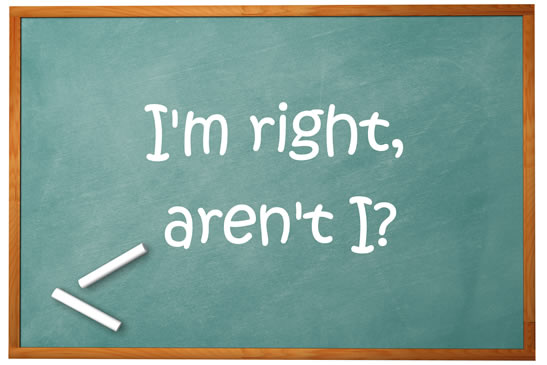Making Simple Questions:
Sentences without BE and
without Auxiliary Verbs
Sentences without BE and
without Auxiliary Verbs

If the sentence to which a simple question is related does not have BE or an auxiliary verb (BE, has / have / had,modal auxiliary), use do, does, or did. The form is Do / Does / Did + subject + verb + other words?
ü Do
Use do for yes/no questions in simple present tense if the subject is (or means) I, you, we, or they:
I need this. ---> Do I need this?
You understand me. ---> Do you understand me?
We have a test tomorrow. --->Do we have a test tomorrow?
They like sashimi. ---> Do they like sashimi?
ü Does
Use does for yes/no questions in simple present tense if the subject is (or means) he, she, or it:
He loves her. ---> Does he love her?
She misses him. ---> Does she miss him?
His computer works. ---> Does his computer work?
ü Did
Use did for yes/no questions in simple past tense for all subjects--I,you, he, she, it, we, they:
I forgot something. ---> Did I forget something?
You lost something. ---> Did you lose something?
He left. ---> Did he leave?
She quit her job. ---> Did she quit her job?
Her computer crashed. ---> Did her computer crash?
We needed that. ---> Did we need that?
They had a good time. ---> Did they have a good time?
Answering Simple Questions:
Sentences without BE and
without Auxiliary Verbs
Sentences without BE and
without Auxiliary Verbs
For simple questions with an auxiliary verb before the main verb, there are three possible answers: with Yes, with No, and with I don't know. The answers with Yes and No can be complete sentences or "abbreviated
forms." In the "abbreviated forms," the auxiliary verb is do, does, or did.
Examples:
Did Fred talk to you?
ü Yes, Fred talked to me.
ü Yes, he did.
ü Yes.
ü No, Fred didn't talk to me.
ü No, he didn't. /No.I don't know.
Did Sophie pass the test?
ü Yes, Sophie passed the test.
ü Yes, she did.
ü Yes.
ü No, Sophie didn't pass the test.
ü No, she didn't.
ü No.I don't know.
Did Bill go to the party?
ü Yes, Bill went to the party.
ü Yes, he did.
ü Yes.
ü No, Bill didn't go to the party.
ü No, he didn't.
ü No.
ü I don't know.
ü etc.
Special Notes:
1. The common verbs do and have can be both main verbs and auxiliary verbs:
- Toby did a good job. (main verb)
- Did Toby do a good job? (auxiliary verb,main verb)
- Toby didn't do a good job. (auxiliary verb,main verb)
- Alice has two brothers. (main verb)
- Alice doesn't have any brothers. (auxiliary verb: does(n't); main verb:have).
- Does Alice have two brothers? (auxiliary verb: does; main verb: have.
We have had enough. (auxiliary verb: have;main verb: have (past participle)
They had had breakfast before wesaw them. (auxiliary verb: had; main verb: have (past participle)
2. Contractions are also common in "abbreviated" answers, but only with No:
Does Joe have red hair?
- Yes, he does.
- No, he doesn't.
Do you want something to eat?
- Yes, I do.
- No, I don't.
Did Marcia call you?
- Yes, she did.
- No, she didn't.
3. When does is the auxiliary verb, there is no -s ( -es, -ies ) on the main verb:
- wrong:
*Does she wants something?
- right:
*Does she want something?
- wrong:
*Does he has a new car?
- right:
*Does he have a new car?
4. When did is the auxiliary verb, the main verb is in simple form, not past:
- wrong:
*Did she wanted something?
- right:
*Did she want something?
- wrong:
*Did they had a good time?
- right:
*Did they have a good time?
5. Remember: Do, does, and did are used when the sentence on which the question is based does not have BE or an auxiliary a main verb.
- wrong:
*Does she is here today?
- wrong:
*Did she was here yesterday?
- wrong:
*Did she already been here?
Source : Tugas B Inggris Tina Kurniawati
- etc.
Facebook Comment :

















0 comments:
Post a Comment